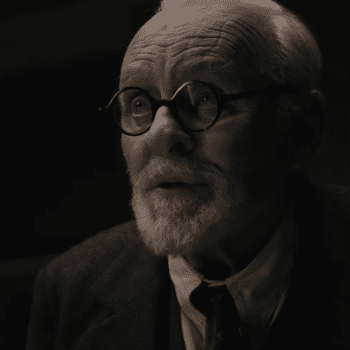The doorbell’s stopped ringing. The candy—at least all the candy you can bear to part with— is gone. You’re ready to watch something scary … but not something that’ll make you want to wash your eyes out with soap or put your immortal soul in jeopardy, y’know? Is there such a thing as a truly frightening, truly edifying horror movie?
Yes, my friends. Yes there is. Take, for example, The Exorcism of Emily Rose.
The 2005 movie begins with the titular character’s death. She died at home, the result of malnutrition and self-inflicted wounds, and under the care of a priest, Father Richard Moore (played by Tom Wilkinson). He’s charged with negligent homicide and chucked in jail, but the priest insists that he was doing the only thing that would’ve helped Emily (Jennifer Carpenter). He was trying to exorcise the demonic spirits that possessed her.
Despite the old saying that possession is nine-tenths of the law, it’s awfully hard to prove demonic possession in court. But Moore’s lawyer, Erin Bruner (Laura Linney), decides to give it a try.
Emily Rose is an interesting combination of fright flick and courtroom drama—The Exorcist meets A Few Good Men, if you will. (“You can’t handle the truth!”) While the movie holds some genuinely scary moments, much of the movie’s suspense actually unspools in the courtroom, where Bruner locks horns with prosecuting attorney Ethan Thomas (Campbell Scott). Just to give the showdown a little added oomph, Bruner, charged with defending one of Catholicism’s most ancient (and some would say superstitious) rites, is agnostic. Thomas, meanwhile, is a devout Methodist who’s “always at church.”
The script contains that same spiritual dissonance. Director Scott Derrickson, a Christian, co-wrote the script with skeptic Paul Harris Boardman, which gives the film a certain ambiguity. While a believer like me might look at Emily Rose’s experiences and say, “Yep, that girl sure has a bad case of possession,” Thomas effectively pushes a case for simple psychosis.
The movie’s tension is further ratcheted up by its set design: The courtroom, Emily’s dorm room and other locales are neatly carved by logical bricks and blocks and right angles everywhere—all clean and logical and boxy. It’s a harsh juxtaposition to Emily’s experiences, and Father Moore’s faith that defy the movie’s secular boxes.
Many horror movies—including many of the very best—are predicated on not just supernatural evil, but supernatural good, too. Demons are real, these movies suggest, but so is God.
The Exorcism of Emily Rose pushes that point home. It asks viewers to not just merely accept the premise of God and the devil for a couple of hours, but to ask, if the premise has merit, what that might mean. The movie works as a horror film. It works as a courtroom drama. But in its own way, it works as a Christian movie, too.
“I think it’s important for anyone who takes cinema seriously not to limit yourself to just optimistic or happy movies,” Derrickson told The National Catholic Register a few years ago. “I think that’s a problem. You’ve got to be willing to let the art of cinema take you into some darker places if you’re going to make full use of it. There are some people who shouldn’t watch horror films, and I’m all right with that.
“It’s not about putting something evil in the world,” he continued. “It’s about reckoning with evil. We don’t need any more evil in the world. We need a lot more reckoning with it.”
If you have some time tonight—or any night, really—you might want to check out The Exorcism of Emily Rose (which you can rent and stream on YouTube, Amazon and Google Play for $2.99, or iTunes for $3.99). It may haunt you in a positive way.













